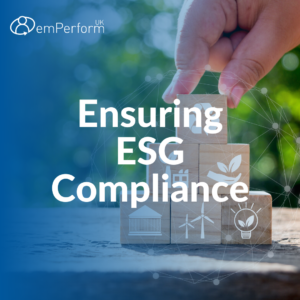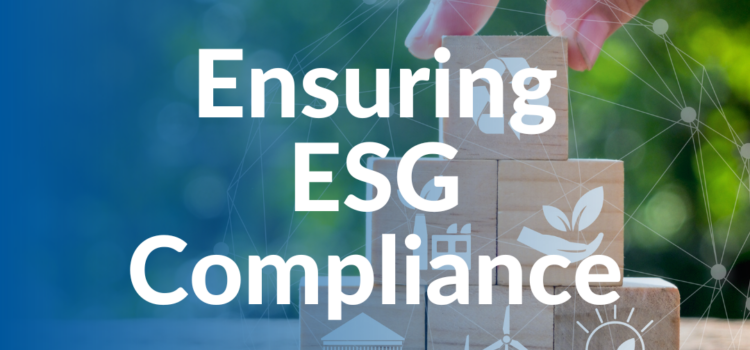
In today’s business landscape, ESG compliance has emerged as a critical framework for companies striving to operate responsibly and sustainably. This blog delves into the multifaceted dimensions of ESG —Environmental, Social, and Governance— shining a light on why these factors are integral to modern business strategies. From attracting top talent and enhancing reputation to mitigating risks and driving innovation, businesses that prioritise ESG compliance stand to gain substantial advantages. Join us as we explore how ESG compliance not only aligns with societal expectations but also fosters resilience and profitability in an evolving global economy.
What is ESG Compliance?
ESG compliance entails a company’s commitment to meeting specific criteria that evaluate its environmental sustainability, social responsibility, and governance practices. Research by Deloitte indicates that a significant majority of employees (over 74%) believe organisations should prioritise actions like reducing environmental impact, enhancing community welfare, and adopting sustainable supply chain practices as part of their core mission. These standards ensure businesses operate ethically and contribute positively to global challenges such as climate change, social inequality, and evolving economic landscapes. By adhering to ESG principles, companies not only align their operations with broader societal values and expectations but also foster trust among stakeholders and promote long-term sustainability.
Why does ESG Matter?
ESG compliance is critical for businesses today as it demonstrates a proactive approach to some of the world’s most pressing challenges.
Talent Attraction and Retention:
The workforce of today, particularly younger generations, places a high value on working for companies that are socially and environmentally responsible. By prioritising ESG factors, businesses can attract and retain top talent who are motivated by purpose-driven work. This can lead to higher employee satisfaction, reduced turnover, and increased productivity.
Reputation Enhancement:
In an era where consumers and investors are increasingly concerned about corporate responsibility, ESG compliance enhances a company’s reputation. Businesses that demonstrate a commitment to sustainable practices and social responsibility build trust with stakeholders, including customers, investors, and the broader community. A strong ESG profile can differentiate a company from its competitors and foster loyalty.
Innovation and Efficiency:
Embracing sustainable practices often drives innovation. Companies that invest in ESG initiatives tend to develop new products and services that meet the growing demand for sustainable solutions. Additionally, sustainable practices can lead to operational efficiencies, such as reducing waste and conserving resources, which can lower costs and improve profitability.
Long term Financial Performance:
There is a growing body of evidence suggesting that companies with strong ESG performance are more resilient and achieve better long-term financial outcomes. A study by NYU/Stern found a “positive relationship between ESG and financial performance for 58% of the “corporate” studies focused on operational metrics such as ROE, ROA”. By focusing on sustainability and responsible governance, businesses can enhance their resilience against market volatility and economic downturns. This approach not only supports long-term profitability but also ensures the company remains viable and competitive in the future.

How does ESG Impact a Company Financially?
ESG factors can significantly influence a company’s financial performance. Companies that excel in ESG practices often experience:
Lower Operational Costs:
Efficient resource use and waste reduction can lead to substantial cost savings. By implementing sustainable practices such as energy efficiency, water conservation, and waste management, companies can reduce their operational expenses. These cost savings can be reinvested into the business, further enhancing its financial performance.
Enhanced Revenue:
Consumers are increasingly willing to pay a premium for products from socially responsible companies. Companies that prioritise ESG practices can capitalise on this growing consumer preference by offering sustainable and ethically produced goods and services. This can lead to increased sales, higher profit margins, and a stronger market position.
Improved Investor Relations:
Investors are more likely to support companies with strong ESG credentials. Companies that demonstrate a commitment to ESG principles often enjoy better access to capital, as socially responsible investment funds and individual investors seek out such opportunities. This increased investor interest can lead to higher stock valuations and a more stable shareholder base.
Risk Mitigation:
Strong ESG practices help companies avoid legal and regulatory penalties, as well as reputational damage from environmental or social missteps. By proactively addressing potential ESG risks, companies can prevent costly fines, lawsuits, and negative publicity. This risk mitigation not only protects the company’s financial performance but also enhances its long-term resilience.

The Role of HR In Driving ESG Compliance?
Human Resources plays a pivotal role in embedding ESG principles within an organisation. HR can drive ESG compliance through the following actions:
Gathering and Providing Data:
HR departments are uniquely positioned to collect and analyse data related to workforce diversity, employee engagement, and other ESG metrics. This data driven approach enables the organisation to track progress, identify areas for improvement, and demonstrate transparency to stakeholders. Using an easy-to-use, inclusive & 100% configurable employee performance management software like emPerform means it’s never been easier to gather all of your company’s essential data.
Ensuring Policies Engage:
HR can develop and implement policies that promote ESG values. This includes initiatives such as diversity and inclusion programs, ethical labour practices, and wellness programs. By crafting policies that align with ESG principles, HR ensures that these values are embedded in the company culture, fostering an inclusive and responsible work environment.
Incorporating ESG Experience and Skills into Talent Management:
Focusing on upskilling and reskilling employees with a dedicated emphasis on ESG principles allows HR to seamlessly integrate ESG criteria into every facet of talent management. This includes prioritising candidates who show a strong commitment to ESG principles during recruitment and continually educating and training employees. By doing so, HR ensures that the workforce not only possesses the essential skills but also shares the company’s dedication to advancing its ESG goals.
Aligning ESG with Financial Performance and Goals:
HR can significantly influence the alignment of ESG initiatives with the company’s overarching financial goals. By illustrating the ways in which sustainable practices enhance profitability and foster growth, HR can facilitate the integration of ESG factors into the company’s financial performance metrics. This alignment ensures that ESG considerations are viewed not merely as supplementary but as essential components of the company’s overall strategy. Consider leveraging emPerform’s goal management tools to establish and monitor SMART goals, further solidifying this strategic integration.

Where to Integrate ESG Policies
Environmental
Minimising Pollution:
Minimise pollutants released into air, water, and soil through cleaner production processes. This includes adopting best practices for waste management, reducing harmful emissions, and ensuring that any byproducts are managed responsibly.
Carbon Emissions:
Implement strategies to reduce greenhouse gas emissions, such as adopting renewable energy sources. This can involve investing in solar, wind, or other renewable energy projects, as well as improving energy efficiency within company operations.
Reduce, Reuse, Recycle:
Promote recycling and the use of recycled materials within the company and its supply chain. Encourage employees and partners to participate in recycling programs and prioritise the purchase of recycled or upcycled products.
Driving Sustainable Culture:
Cultivate a culture of sustainability through employee education and engagement. Provide training on sustainability practices and encourage employees to adopt eco-friendly habits both at work and in their personal lives. Use ongoing feedback to monitor employee thoughts and suggestions on sustainability initiatives, ensuring continuous improvement and active participation in fostering a greener workplace.

Social
Diversity, Equity, and Inclusion:
Foster a diverse and inclusive workplace where all employees have equal opportunities. Implement policies that promote gender equality, racial diversity, and inclusion of individuals with disabilities.
Work Life Balance:
Prioritise the physical and mental health of employees through wellness programs and safe working conditions. This can include health screenings, mental health support services, and ergonomic workplace designs. Explore emPerform’s 360-degree review feature to gain first hand insights into what matters most to your employees and identify opportunities to prioritise work life balance effectively.
Salary:
Ensure fair and competitive compensation practices by regularly reviewing and adjusting salaries to maintain equity and competitiveness in the market. Utilise anonymous salary surveys to gather employee feedback on pay. According to Forbes, compensation inequality is a significant issue in today’s workforce. Benchmarking against market competitors using tools like Glassdoor, LinkedIn Salary, or PayScale is a wise move to ensure your compensation practices are in line with industry standards.
Volunteering:
Encourage and facilitate community engagement and charitable activities. Organise volunteer opportunities, support local charities, and encourage employees to participate in community service. Use these volunteering experiences as team building activities to help employees build connections with each other, fostering a sense of camaraderie and teamwork while contributing positively to the community.
Recruiting and Onboarding:
Implement inclusive hiring practices and provide thorough onboarding to integrate new hires into the company culture. Ensure that recruitment strategies reach diverse talent pools and that onboarding processes emphasise the company’s commitment to ESG values.
Performance Evaluations:
Integrate ESG criteria into performance reviews and incentive structures. Recognise and reward employees who contribute to the company’s ESG goals, ensuring that these efforts are valued and supported at all levels.

Governance
Aligning Policies and Practices:
Ensure that internal policies are consistent with ESG goals and best practices. Regularly review and update policies to reflect the latest ESG standards and practices.
Reporting and Transparency:
Maintain open and honest communication about ESG performance through regular reporting. Publish detailed ESG reports that outline the company’s achievements, challenges, and future goals, ensuring stakeholders are well-informed. Using emPerform’s reporting and analytics tools, such as performance and status reporting and dashboards, gaining insight into the performance health of your organisation becomes effortless. With emPerform, you can quickly create reports, analyse employee performance analytics, easily track the status of performance efforts, and ensure that you have the right mix of skills and competencies where they are needed most.
Contracts:
Embed ESG criteria in contracts with suppliers, partners, and other stakeholders to promote responsible practices throughout the value chain. Ensure that all business relationships support the company’s ESG objectives and encourage partners to uphold similar standards.

As businesses navigate an increasingly complex landscape, embracing ESG compliance is no longer just a choice but a strategic imperative. By integrating environmental sustainability, social responsibility, and robust governance practices, companies not only reduce risks and enhance reputation but also drive long term financial performance. The insights shared in this blog underscore the importance of embedding ESG principles across all facets of operations—from HR policies to corporate governance and community engagement. Embracing ESG isn’t merely about compliance; it’s about building a sustainable future where businesses thrive while contributing positively to society and the environment.
If you want to streamline your employee review processes and easily manage your company’s goals, it can be easily achieved with emPerform. Book a FREE demo today or contact us for any advice on performance management.
